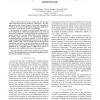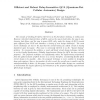93 search results - page 11 / 19 » Timed Unfoldings for Networks of Timed Automata |
122
click to vote
CN
2010
15 years 1 months ago
2010
The dynamic point coverage problem in wireless sensor networks is to detect some moving target points in the area of the network using as little sensor nodes as possible. One way ...
142
click to vote
FORMATS
2006
Springer
15 years 5 months ago
2006
Springer
Recently, a new approach to the symbolic model checking of timed automata based on a partial order semantics was introduced, which relies on event zones that use vectors of event o...
146
Voted
PERCOM
2010
ACM
15 years 6 days ago
2010
ACM
—Social Networks will unfold their full potential when connected people are enabled to collaborate - any time, appropriate to the current location, activity and computing environ...
177
click to vote
CVPR
2009
IEEE
16 years 9 months ago
2009
IEEE
This paper deals with the problem of tracking multiple targets in a distributed network of self-configuring pan-tilt-zoom cameras. We focus on applications where events unfold over...
106
click to vote
DFT
2006
IEEE
15 years 5 months ago
2006
IEEE
The concept of clocking for QCA, referred to as the four-phase clocking, is widely used. However, inherited characteristics of QCA, such as the way to hold state, the way to synch...


